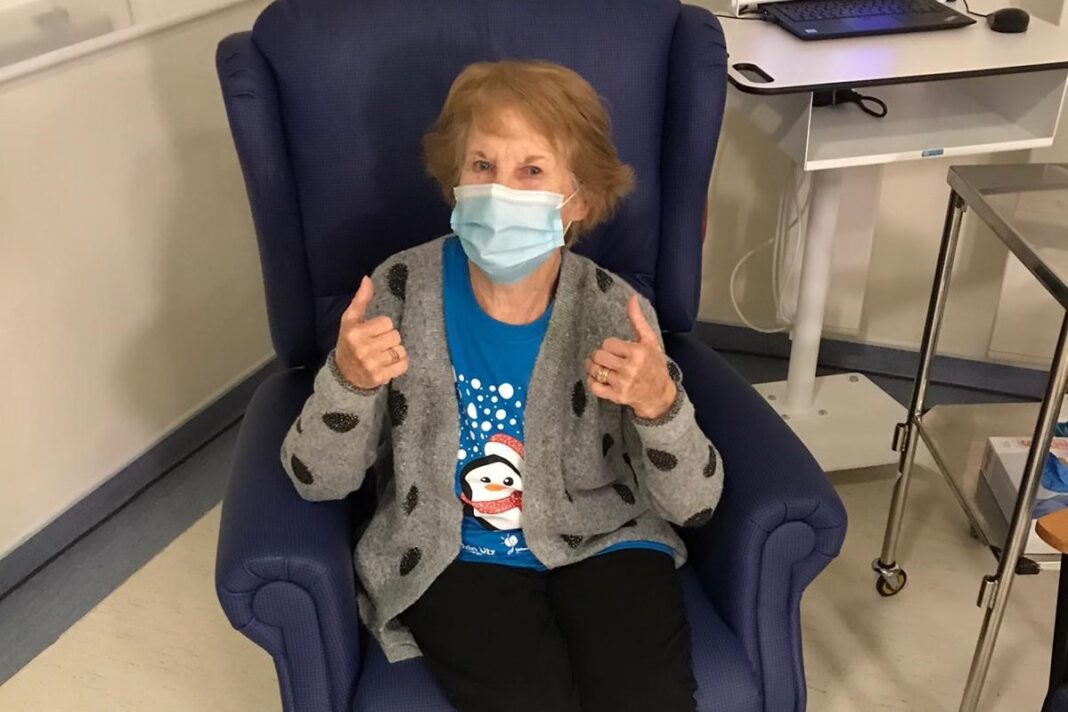Today the first vaccinations in the UK against COVID-19 begin!
Margaret Keenan, 90, from Enniskillen, Northern Ireland, became the first person in the world to receive the Pfizer/BioNTech vaccine outside of a clinical trial, marking the start of the UK’s mass vaccination programme.
Maggie, who turns 91 next week, is a former jewellery shop assistant who only retired four years ago. She has a daughter, a son and four grandchildren and is looking forward to being able to go out again once she receives the top up dose.

Maggie said, ‘I feel so privileged. It’s the best early birthday present I could wish for because I can finally look forward to spending time with my family and friends in the New Year after being on my own for most of the year.’
“I can’t thank May and the NHS staff enough who have looked after me tremendously, and my advice to anyone offered the vaccine is to take it – if I can have it at 90 then you can have it too!”

NHS England chief executive Sir Simon Stevens praised all those involved in delivering the new vaccine programme.
“Less than a year after the first case of this new disease was diagnosed, the NHS has now delivered the first clinically approved COVID-19 vaccination – that is a remarkable achievement,” Stevens said: “A heartfelt thank you goes to everyone who has made this a reality – the scientists and doctors who worked tirelessly, and the volunteers who selflessly took part in the trials. They have achieved in months what normally takes years.

“My colleagues across the health service are rightly proud of this historic moment as we lead in deploying the PfizerBioNTech vaccine.
“I also want to thank Margaret, our first patient to receive the vaccine on the NHS.
“Today is just the first step in the largest vaccination programme this country has ever seen. It will take some months to complete the work as more vaccine supplies become available and until then we must not drop our guard. But if we all stay vigilant in the weeks and months ahead, we will be able to look back at this as a decisive turning point in the battle against the virus.”
Like many around the country, Maggie has been self-isolating for most of this year and is planning on having a very small family ‘bubble’ Christmas to keep safe.
Originally from Enniskillen, Northern Ireland, she has lived in Coventry for over sixty years. She will receive a booster jab in 21 days to ensure she has the best chance of being protected against the virus.
Today the first vaccinations in the UK against COVID-19 begin. Thank you to our NHS, to all of the scientists who worked so hard to develop this vaccine, to all the volunteers – and to everyone who has been following the rules to protect others. We will beat this together. https://t.co/poOYG1vHQe
— Boris Johnson (@BorisJohnson) December 8, 2020
NHS nurse May Parsons said it was a “huge honour” to be the first in the country to deliver the vaccine to a patient.
Speaking at University Hospitals Coventry and Warwickshire NHS Trust, nurse May Parsons, said: “It’s a huge honour to be the first person in the country to deliver a COVID-19 jab to a patient, I’m just glad that I’m able to play a part in this historic day.
“The last few months have been tough for all of us working in the NHS, but now it feels like there is light at the end of the tunnel.”
May, originally from the Philippines has worked in the NHS for the last 24 years and been at University Hospitals Coventry and Warwickshire since 2003.
The phased vaccination programme will see patients aged 80 and above who are already attending hospital as an outpatient, and those who are being discharged home after a hospital stay, among the first to receive the life-saving jab.
Care home providers are also being asked by the Department of Health and Social Care to begin booking staff in to vaccination clinics. GPs are also expected to be able to begin vaccinating care home residents.
Any appointments not used for these groups will be used for healthcare workers who are at highest risk of serious illness from COVID-19.
Health chiefs have set out how they will deliver the mammoth task ahead, using hospital hubs, vaccination centres and other community locations as well as GP practices and pharmacies.
The life-saving vaccine is typically delivered by a simple injection in the shoulder but there is a complex logistical challenge to deliver from the manufacturers to patients. It needs to be stored at -70C before being thawed out and can only be moved four times within that cold chain ahead of use.
A global media for the latest news, entertainment, music fashion, and more.




